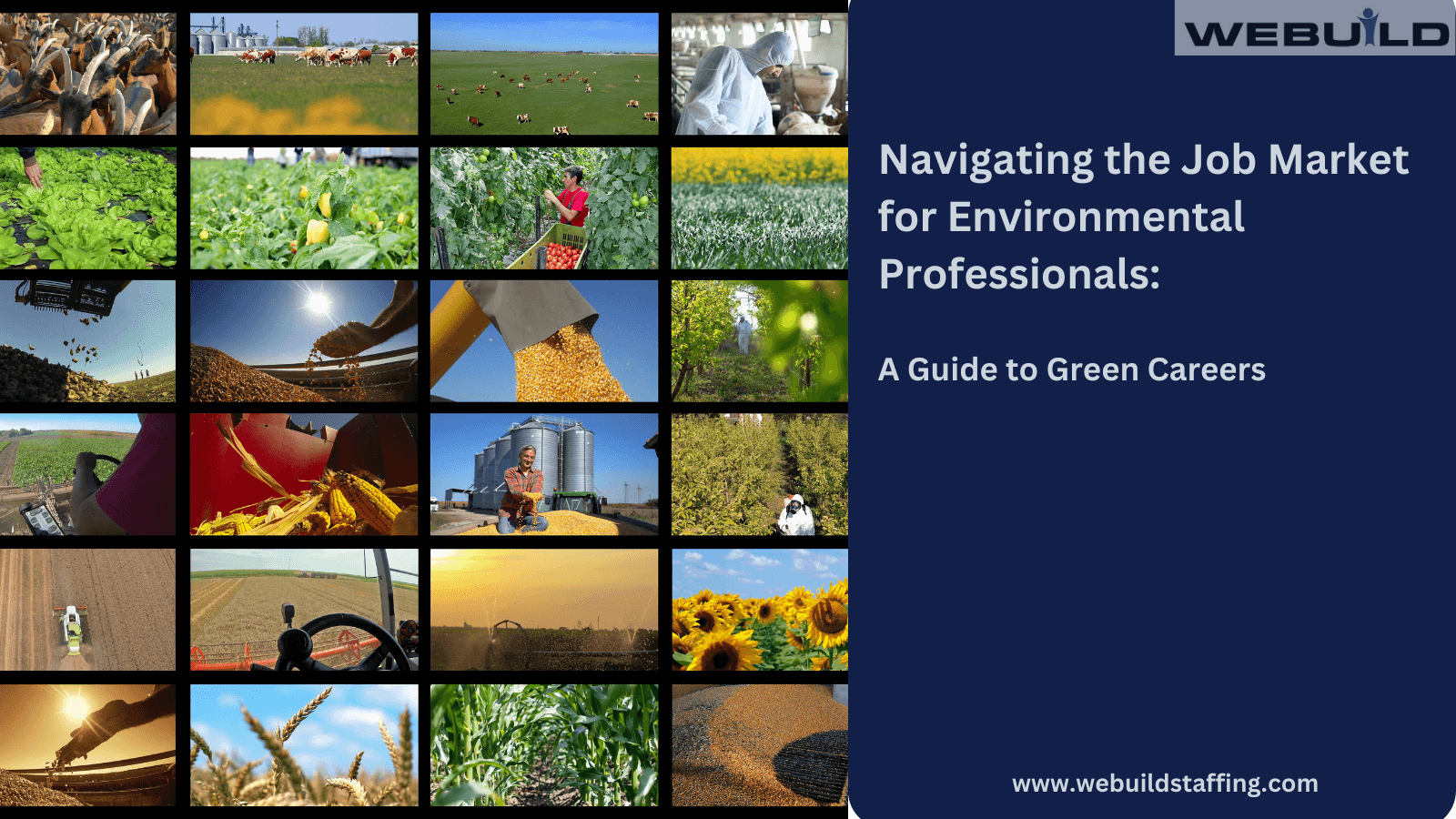Navigating the Job Market for Environmental Professionals: A Guide to Green Careers
WEBUILD STAFFING BLOG |
Navigating the Job Market for Environmental Professionals: A Guide to Green Careers

In an era marked by growing environmental awareness and the urgent need for sustainable practices, green careers have emerged as a promising field for environmentally conscious professionals. These careers offer a unique opportunity to make a positive impact on the planet while also enjoying fulfilling and economically viable job prospects. However, navigating the job market for environmental professionals can be challenging, given its dynamic nature and diverse opportunities. In this comprehensive guide, we will explore the world of green careers, highlighting key sectors and job roles, essential skills and qualifications, and effective strategies for finding your dream job in the environmental sector. Whether you’re a recent graduate or a seasoned professional looking to transition into a green career, this guide will provide valuable insights to help you make informed decisions and succeed in the evolving job market for environmental professionals.
Understanding the Green Economy
The term “green economy” encompasses a wide range of industries and sectors that prioritize sustainability and environmental responsibility. Within this framework, there are several key areas where environmental professionals can make a significant impact:
- Renewable Energy: The renewable energy sector is booming, with a growing demand for professionals in solar, wind, hydro, and geothermal energy production. Jobs in this sector include renewable energy project managers, engineers, technicians, and researchers.
- Sustainability Consulting: Companies across industries are seeking sustainability experts to help them reduce their environmental footprint and comply with regulations. Sustainability consultants work closely with organizations to develop eco-friendly strategies and practices.
- Environmental Science and Research: Environmental scientists and researchers play a crucial role in understanding and mitigating environmental issues. They work in various fields, including climate change, biodiversity conservation, and pollution control.
- Environmental Engineering: Environmental engineers design and implement solutions to address environmental challenges, such as water and air pollution, waste management, and sustainable infrastructure development.
- Green Building and Architecture: Sustainable building practices are on the rise, creating opportunities for architects, designers, and engineers to create eco-friendly structures that conserve resources and minimize environmental impact.
- Natural Resource Management: Professionals in this field focus on preserving and managing natural resources, including forests, water, and wildlife. Job roles include forestry managers, conservation biologists, and wildlife ecologists.
- Environmental Education and Advocacy: Environmental educators and advocates work to raise awareness about environmental issues, promote sustainable behaviors, and influence policy decisions.
Qualifications and Skills for Green Careers
To thrive in the job market for environmental professionals, you need a combination of education, skills, and qualities that demonstrate your commitment to sustainability and environmental stewardship:
- Education: Most green careers require at least a bachelor’s degree in a relevant field, such as environmental science, environmental engineering, ecology, or sustainability studies. Advanced degrees, such as master’s or Ph.D. programs, can open up higher-level positions and research opportunities.
- Technical Skills: Depending on your chosen field, you may need specialized technical skills. For example, environmental engineers should be proficient in modeling software, while renewable energy professionals need knowledge of solar panel installation and maintenance.
- Analytical Skills: Strong analytical skills are essential for assessing environmental data, conducting impact assessments, and developing sustainable solutions.
- Communication Skills: Effective communication is crucial for explaining complex environmental issues to diverse audiences, including policymakers, the public, and colleagues.
- Problem-Solving Abilities: Environmental professionals often face complex challenges that require creative problem-solving and critical thinking skills.
- Adaptability: Given the evolving nature of environmental issues and regulations, adaptability and a willingness to learn are highly valued traits.
Strategies for Finding Green Career Opportunities
Now that you understand the qualifications and skills required for green careers, let’s explore effective strategies for navigating the job market as an environmental professional:
- Networking: Building a strong professional network is essential. Attend industry events, conferences, and workshops, and join relevant online forums and social media groups. Engaging with professionals in your field can lead to job referrals and valuable insights.
- Internships and Volunteering: Gain practical experience through internships and volunteer work with environmental organizations, government agencies, or research institutions. These experiences not only enhance your resume but also help you make industry connections.
- Job Search Engines: Utilize specialized job search engines and websites dedicated to green careers. Look for job listings on platforms like LinkedIn, Indeed, and GreenJobs.
- Professional Associations: Join environmental professional associations and organizations relevant to your field. These groups often provide job listings, career resources, and opportunities for skill development.
- Advanced Education: Consider pursuing advanced degrees or certifications to increase your marketability. Specialized training programs in areas like sustainability management or renewable energy can give you a competitive edge.
- Tailored Resumes and Cover Letters: Customize your resume and cover letter for each job application, highlighting your relevant skills and experiences. Emphasize how your background aligns with the organization’s sustainability goals.
- Interview Preparation: Prepare for interviews by researching the organization’s environmental initiatives and demonstrating your knowledge of industry trends and challenges.
- Online Presence: Maintain a professional online presence by updating your LinkedIn profile and sharing articles or research related to your field. This can help potential employers find you.
Green Career Success Stories
To provide inspiration and insight, let’s explore the success stories of individuals who have navigated the job market for environmental professionals and made a meaningful impact on the environment.
- Solar Energy Innovator: Sarah, an environmental engineer, started her career by interning at a solar energy company during her undergraduate studies. She later pursued a master’s degree in renewable energy and joined a research team focused on improving solar panel efficiency. Today, she leads a team of engineers at a leading solar company, developing cutting-edge technology that is helping to transform the energy landscape.
- Sustainability Consultant: James, with a background in sustainability studies, began his career as a sustainability consultant for a small firm. He worked with local businesses to reduce waste and energy consumption, helping them save money while minimizing their environmental impact. His success led to partnerships with larger companies, and he now runs his own sustainability consulting firm, advising organizations worldwide.
- Environmental Educator: Emily, passionate about environmental education, started her career as a park ranger. She engaged with visitors, conducted nature programs, and developed educational materials. Over the years, she moved into a leadership role at a renowned nature center, where she oversees educational programs that inspire the next generation of environmental stewards.
The job market for environmental professionals offers a plethora of opportunities for those committed to making a positive impact on the planet. By acquiring the necessary education, skills, and experience and leveraging effective job search strategies, you can navigate this dynamic field and find a rewarding green career. Remember that each environmental professional’s journey is unique, and success can come in many forms, from innovative renewable energy solutions to inspiring environmental education initiatives. Embrace your passion for sustainability, stay adaptable, and never stop learning as you embark on your journey toward a greener future.
We build Staffing Agency is a leading executive search and staffing agency dedicated to the construction, engineering and environmental industries. To learn more please visit: www.webuildstaffing.com










